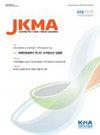msami病的药物治疗
IF 0.5
Q3 MEDICINE, GENERAL & INTERNAL
引用次数: 0
摘要
背景:尽管听力学方面取得了重大进展,但由于其多因素病因,目前还没有确定的治疗方案。目前的概念:membroini本文章由计算机程序翻译,如有差异,请以英文原文为准。
Pharmacological treatment of Ménière disease
Background: Despite significant progress in audiology, there is no definitive treatment option for Ménière disease due to its multifactorial etiology.Current Concepts: The primary treatment goal for Ménière disease is first, to decrease the frequency of symptoms and, second, to minimize the severity of vertigo and hearing loss. Concurrently, the preservation of vestibular and auditory functions should be prioritized. The protection of vestibular and auditory functions should also be considered. Treatment options for Ménière disease include lifestyle modifications, medical treatment, and surgical intervention. Recent treatment algorithms aim to gradually escalate the invasiveness of the treatment to assist in developing a more uniform treatment approach.Nanomaterials, including nanoparticles and nanocarriers, offer an array of novel diagnostic and therapeutic applications for achieving effective drug delivery into the inner ear of patients with Ménière disease. New treatment drugs, such as SPI-1005 (Sound Pharmaceuticals) are currently under clinical trial. Furthermore, drugs are also being repurposed and investigated for their potential in treating Ménière disease.Discussion and Conclusion: Developing new drugs and investigating the pathophysiology of Ménière disease for subtyping is emerging. These may direct the future diagnosis and treatment of the disease and facilitate a better understanding of disease mechanisms. Patients with different subtypes of Ménière disease may require different treatment strategies, which can be achieved by personalized therapy, accurate prognosis prediction, and even, disease prevention.
求助全文
通过发布文献求助,成功后即可免费获取论文全文。
去求助
来源期刊

Journal of The Korean Medical Association
Medicine-General Medicine
CiteScore
0.50
自引率
0.00%
发文量
84
审稿时长
4-8 weeks
期刊介绍:
The Journal of the Korean Medical Association (JKMA) is the official peer-reviewed, open-access, monthly journal of the Korean Medical Association (KMA). It contains articles in Korean or English. Its abbreviated title is ''J Korean Med Assoc''. The aims of the Journal include contributing to the treatment of and preventing diseases of public health importance and to improvement of health and quality of life through sharing the state-of the-art scientific information on medicine by the members of KMA and other national and international societies.
 求助内容:
求助内容: 应助结果提醒方式:
应助结果提醒方式:


